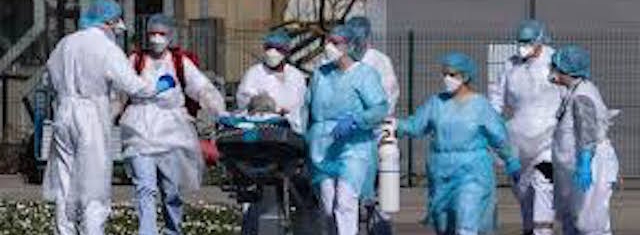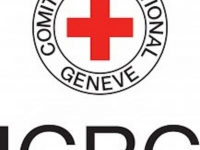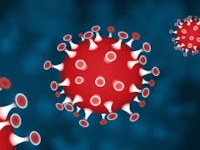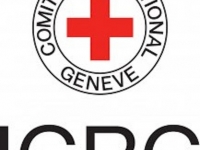Local
ICRC WARNED FOR URGENT ACTION NEEDED TO COUNTER MAJOR THREAT TO LIFE
OVER COVID-19 IN CONFLICTS ZONES

Doctor over COVID-19 (Source: Sciences)
USPA NEWS -
An immediate and concerted response by states and humanitarian organizations is vital
It will be nearly impossible to fight COVID-19 in countries already devastated by conflict unless a concerted response by states and humanitarian organizations is launched immediately, the International Committee of the Red Cross (ICRC) has warned. Plans to prevent and respond to the virus must urgently move forward before it gains a foothold in conflict zones.
It will be nearly impossible to fight COVID-19 in countries already devastated by conflict unless a concerted response by states and humanitarian organizations is launched immediately, the International Committee of the Red Cross (ICRC) has warned. Plans to prevent and respond to the virus must urgently move forward before it gains a foothold in conflict zones.
An immediate and concerted response by states and humanitarian organizations is vital
It will be nearly impossible to fight COVID-19 in countries already devastated by conflict unless a concerted response by states and humanitarian organizations is launched immediately, the International Committee of the Red Cross (ICRC) has warned. Plans to prevent and respond to the virus must urgently move forward before it gains a foothold in conflict zones.
COVID-19 represents a major threat to life in countries with strong health systems. But the threat is even greater in places where health systems have been ravaged by war, where people uprooted by conflict live in close proximity, and where life-saving resources like clean water, soap and medicine are in short supply.---------------------------------------------------------------
Additionally, health systems weakened by conflict have reduced capacity for detection, management and the follow-up of cases of sickness, which in turn increases the risk of transmission."COVID-19 has overwhelmed advanced health care systems. Many of the places where we work lack even basic health care infrastructure, let alone intensive care capacity. Our fear is that unless urgent action is taken to curb the spread of the virus, it will devastate some of the world's most vulnerable communities," said Peter Maurer, President of the International Committee of the Red Cross.---------------------------------------
The ICRC fears the worst for people in prisons and displacement camps around the world. Health systems in conflict zones in places such as Syria, Yemen, South Sudan, northeast Nigeria, and Afghanistan are simply not prepared to handle a flood of COVID-19 cases without a surge in support.An immediate and concerted response by states and humanitarian organizations is vital. COVID-19 does not have to be catastrophic for war-torn countries with weakened health care systems, but it does require the international community to scale up support. Last week the International Red Cross and Red Crescent launched an appeal for 800 million Swiss francs, a call for States to boost resources for countries with limited capacity to respond to this urgent threat.In displacement camps, physical distancing is not possible, and we fear it will be impossible to stop the spread of coronavirus once it enters a camp. Indeed, we fear the virus will spread rapidly and viciously, straining the medical response. Containment will be difficult, as it is harder to trace and isolate suspected cases when people flee their homes due to violence.Warfare has not stopped because of the virus, and victims of conflict still need and deserve assistance.
"Our work helping victims of conflict is still needed even amid an increased response to the virus. This work is made extra difficult because of the scale of this current pandemic, and the necessary and vital measures countries are now taking to contain it, such as movement restrictions of people and goods. To avoid a catastrophe, governments and other armed actors in conflict theaters must facilitate the work of humanitarians as a priority. Viruses know no borders: this is a global problem which will only be solved by global action," said President Maurer.
TRY TO PREVENT AND ASSIST WITH THE COVID-19 PANDEMIC WITH RED CROSS-------------------------------------
Even as the ICRC continues its work in places of war, it is re-orienting its activities to try to prevent and assist with the COVID-19 pandemic, often in close collaboration with National Red Cross and Red Crescent Societies and the IFRC. Some of the ICRC's COVID-19 response includes:
In Afghanistan and Myanmar, ICRC's work in prisons and in support of health systems is focusing on COVID-19 preparedness, detection, and preventive procedures. We are also creating a rapid response plan with isolation measures, hygiene improvement and protective materials.
In Armenia, the ICRC recently donated soaps and disinfectant products to medical units of the country's 12 detention centers. We also provided infrared thermometers to four penitentiaries.
In Burkina Faso, we are running radio spots about COVID-19. We continue to improve access to clean water and soap in areas affected by violence, and distribute soap and gel in places of detention.
In Colombia, the ICRC over the next three months will support the refurbishment of lavatories and the provision of hygiene materials in 20 detention centers to restrain COVID-19.
In the Democratic Republic of Congo, we are helping the hospitals we support to set up quarantine measures, training health care staff in suspected case isolation, and implementing infection prevention control measures in health facilities and places of detention visited by the ICRC.
In El Salvador, we are distributing soap to detainees to assist with hand washing.
In Gaza, the ICRC has donated 500 mattresses and 1,000 blankets for people in quarantine. It has also donated 43 infrared thermometers to health authorities to help screening suspected cases.
In Iraq, we have donated soap and disinfectant, protective equipment like gloves, goggles and gowns and thermometers to 13 places of detention housing 22,000 detainees. We'll soon donate to another 11 institutions holding 20,000 detainees, including materials for handwashing and chlorine spray.
In Mexico, the ICRC and Mexican Red Cross are distributing water, hygiene kits and information on the virus to help prevent its spread.
In Lebanon, the ICRC runs an emergency ward at the Rafik Hariri University Hospital ““ where COVID-19 cases are being treated.
In Somalia, we provided tents for isolation to the Mogadishu hospital we support and are implementing a surveillance system to monitor suspected cases at clinics supported by the Somali Red Crescent. We are also providing hygiene items in places of detention and giving soap, chlorine tabs and hygiene information on COVID-19 to more than 120,000 households.
In Sudan, we are repairing dozens of handpumps and distributing soap to tens of thousands of displaced people, and helping government health agencies to stock gloves, gowns and disinfectant.
In Syria, in Al Hol Camp, our field hospital remains operational and our team has started to take all necessary and preventive measures to protect the patients against COVID-19. Source: International Committee of the Red Cross (ICRC).
Liability for this article lies with the author, who also holds the copyright. Editorial content from USPA may be quoted on other websites as long as the quote comprises no more than 5% of the entire text, is marked as such and the source is named (via hyperlink).








